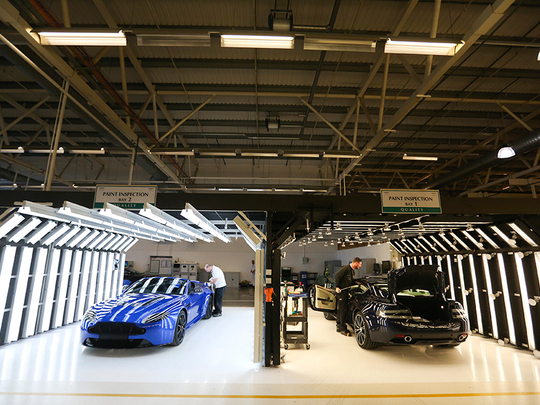
London: After Prime Minister Theresa May persuaded Nissan Motor Co to increase investment in a UK factory with a promise to keep it financially viable, other industries are pressing their own Brexit requests.
Business leaders are stepping forward with wish lists for the country’s future outside the European Union, ranging from tariff-free single-market access for farmers to free movement of labour for advertising agencies to research funding for pharmaceutical companies.
“Any deal that’s been done — normally that should levelize and everybody should enjoy it,” Aston Martin Lagonda Ltd Chief Executive Officer Andy Palmer said by phone, referring to other carmakers that have factories in the UK, including Honda, Ford and Toyota.
The government quickly reassured other automakers that they’d benefit from the same incentives it provided Nissan, though neither side has provided details. Other industry groups are ramping up their lobbying ahead of the government’s November 23 statement of its plans for the economy.
Complex talks
The breadth of the demands highlights the complexity of negotiating an EU exit that meets the needs of British companies while satisfying Brexit campaigners’ hopes for a clean break. Business groups mostly favoured staying in the EU, as did May. Now they’ve got to figure out how to leave in a way that limits economic disruptions.
For UK service industries, which account for nearly 80 per cent of the economy, maintaining the country’s tradition of openness is paramount. A survey published this week by the Managing Partners’ Forum, which represents law, audit and consulting firms, found that 72 per cent rated freedom of movement across borders with the EU as essential or important to their success after Brexit.
“Fully integrated professional firms operate globally so depend on the ability to move people and sell services without restriction,” forum CEO Richard Chaplin said in a statement. Representatives of professional services firms pressed their case in a meeting Tuesday with Chancellor of the Exchequer Philip Hammond.
Lobbying group TechU. K. said in a statement Wednesday that losing access to the single market would cause “far-reaching implications not just for tech companies but the whole services-based economy.”
Banks in the City of London want to maintain “passporting” rights, which let them sell financial services throughout the EU. Representatives of so-called fintech firms met with government officials Tuesday and Wednesday.
The National Farmers Union urged the government to seek an agreement that lets agricultural exporters keep hiring EU workers, who do much of the work of planting vegetables and picking berries across the UK. The Northern Ireland Food and Drink Association, in an emailed statement, called for maintaining a “soft” border with the Republic of Ireland to facilitate trade.
After Brexit
Whether May’s government will be able to follow through on promises to the likes of Nissan is unclear. Pledges made now won’t necessarily reflect what happens once Britain has left the EU, according to a German government official familiar with Chancellor Angela Merkel’s thinking.
“The government really can’t give them these assurances,” said Swati Dhingra, a lecturer at the London School of Economics who specialises in trade. “It’s really a case of the EU having to give this to the UK”
Former Chancellor of the Exchequer Alistair Darling urged the government not to favour certain industries, saying in a Bloomberg TV interview Wednesday that “you can’t possibly segregate bits of the British economy and say that one matters today, and that one can wait for a couple of years.”
The Nissan agreement nonetheless sent an encouraging signal to other manufacturing industries, said Paul Everitt, CEO of aerospace lobbying organisation ADS Group.
“They recognise that aerospace is a strategically important sector and they clearly are focused on ensuring that its long-term success is baked into their approach to the negotiations,” he said by phone.
After the Nissan deal, Honda said it wants to stay in the UK but can’t make any permanent decisions about the status of its plant near Swindon, England, until the terms of Brexit are clearer.
“We will decide what we do by closely monitoring the currency and tariffs,” executive vice president Seiji Kuraishi said in Tokyo this week. “As for now we have no intention of leaving the UK and hope to keep the business there.”
Love it
Some executives in other lines of work expressed envy over the incentives to carmakers, questioning whether the government should be seen as favouring certain industries.
“I doubt whether the government would extend that to our industry,” CEO Martin Sorrell of advertising giant WPP Plc said by phone. “Of course we would love it if they did.”
For Britain’s pharmaceutical sector, which counts powerhouses like GlaxoSmithKline Plc and AstraZeneca Plc as well as scores of smaller biotechnology companies, access to research funding is crucial. The UK received a net €3.4 billion ($3.8 billion) in research grants from the EU from 2007 through 2013, according to the Royal Society. Hammond has guaranteed such funding through 2020, but not beyond.
“Scientific funding is one of the things we really stand to lose,” Luke Tryl, author of a report on Brexit by medical research firm Quintiles IMS, said at a briefing Wednesday. “We shouldn’t assume that just because we are a scientific leader now, that the Europeans will just hand it to us on a plate.”












